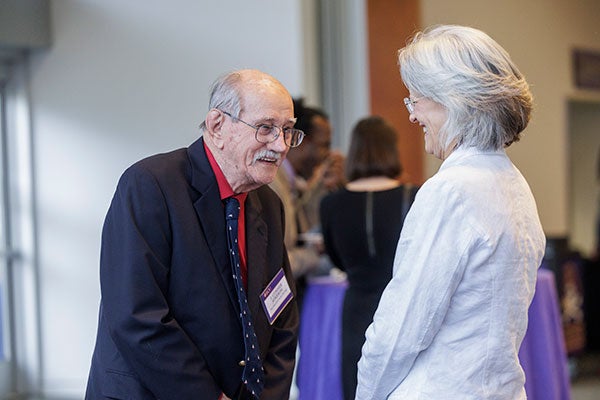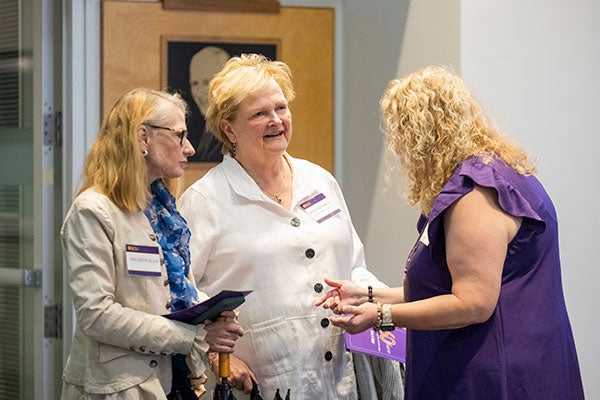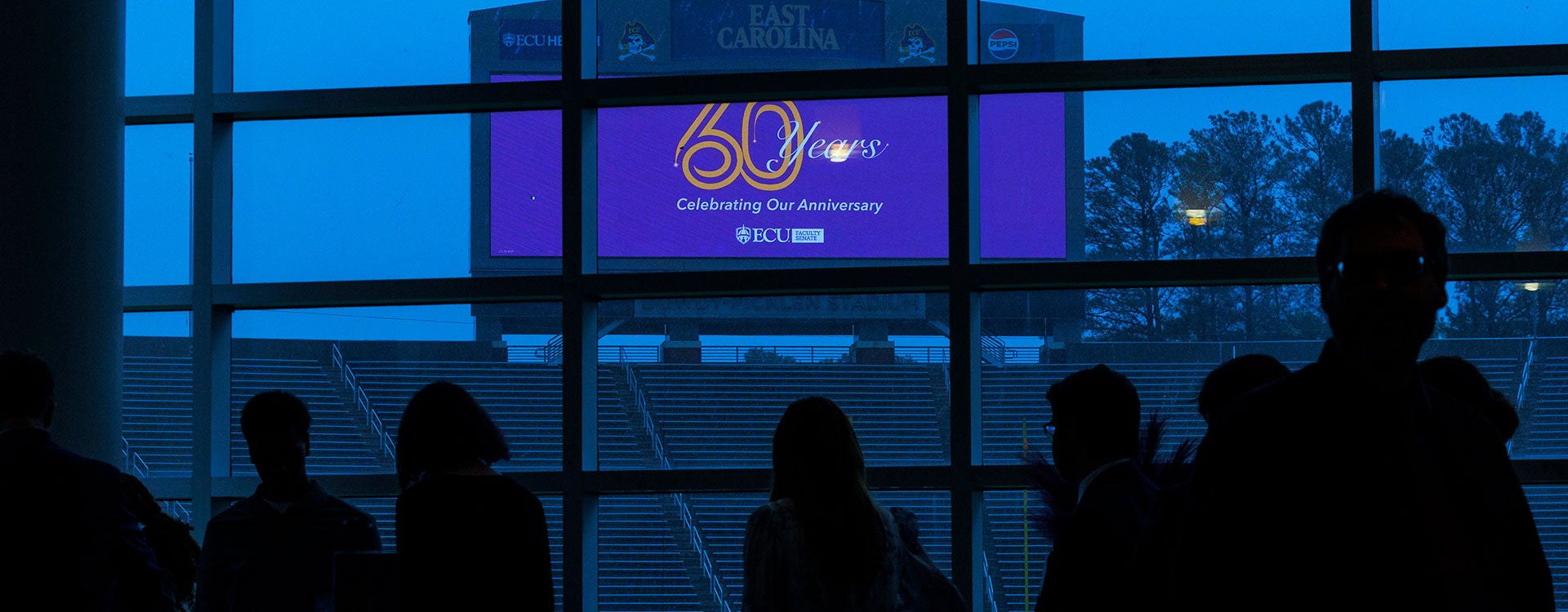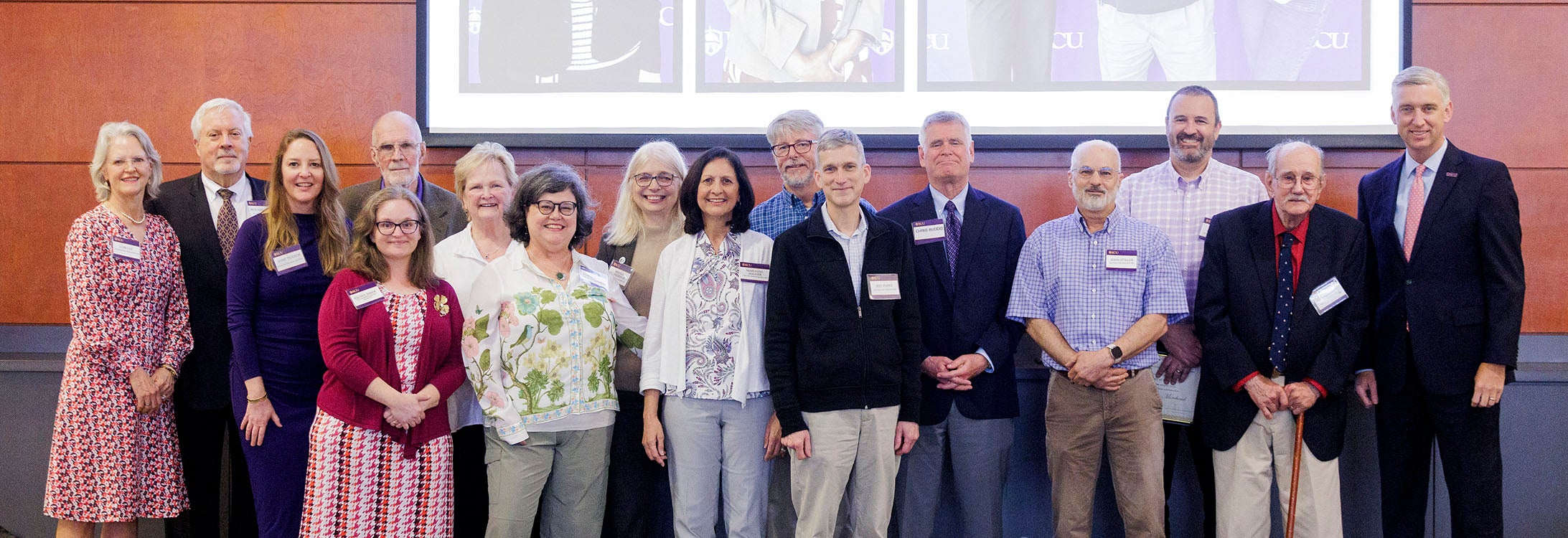ECU Faculty Senate celebrates 60th anniversary
East Carolina University is celebrating a managerial milestone this year: the 60th anniversary of the ECU Faculty Senate.

Left, former faculty chair Conner Atkeson talks with Lori Lee at the celebration.
The group formally organized in 1965 as a legislative and advisory body representing all faculty. ECU Faculty Senate maintains a strong, long-standing shared governance structure, meaning that faculty and administrators work together to make decisions.
Dozens of current and former faculty members, past senate chairs, staff and administrators attended a reception in the Murphy Center on April 7 featuring entertainment by ECU School of Music faculty and students.
“The faculty bring passionate and creative approaches to teaching, research and service,” Chancellor Philip Rogers said during his remarks. “You are committed to ensuring that students have transformative, high-quality learning experiences at ECU, both inside and outside the classroom.”
ECU has about 2,000 faculty serving almost 27,000 students. Rogers said he couldn’t help but think of the original 11 faculty who served about 100 students when East Carolina Teachers’ Training School opened in 1909.
“I have no doubt that they would be amazed at the breadth, depth, expertise, experience and passion that our faculty and Faculty Senate exhibit each day,” he said. “It’s an accomplishment to be celebrated but I really believe that it also serves as motivation to build upon decades of excellent work, great work, educating learners, demonstrating a strong and sustained model of shared governance at ECU.”
Rogers thanked all the faculty who have served ECU over six decades including its first Faculty Senate chair, the late Dr. James E. Poindexter, and the current chair, Dr. Anne Ticknor.
“We are grateful for the many contributions you have made to the life of ECU and that you continue to make in the roles that you serve,” Rogers said.
Interim Provost Chris Buddo reflected on his experience with Faculty Senate as a professor and former director of the School of Music and as dean of the College of Fine Arts and Communication. He also has participated in several committees.
“I have gotten to see shared governance from a number of angles, and I’m here to tell you, I’m a big fan. Especially at a time when we’ve got the sort of headwinds that we’re facing these days, I think the collective wisdom that comes from shared governance is more important than ever,” Buddo said. “I thank you who participate in that and I will remind you as I remind myself every day that with shared governance comes shared responsibilities. We take those responsibilities seriously, and I appreciate the seriousness with which you approach your work.”
Ticknor summarized the challenge in a comment from former Faculty Senate chair Don Sexauer in 1998. “Shared governance in an academic setting is a fragile balancing act that takes place between the administration of the university and its faculty. It is the attempt by the administration and the faculty to solve problems and implement policies in a manner that benefits all the constituencies of the university,” he said.

Former faculty chair Patricia Anderson, middle, talks with Melinda Doty, right, secretary of the faculty, and Maureen Ellis from the College of Education.
“Now nearly 30 years later, in my final term as faculty chair, I can reiterate these words and state that the fragile balance of shared governance continues,” Ticknor said. “I can also report that ECU continues to choose shared governance and continues to strive for a balance in a rapidly changing and chaotic current higher education environment. Part of what I have learned during my time as chair of the faculty is that when shared governance parties take responsibility within their roles, the balance can be less fragile and our solutions to problems are more conducive to our entire university.”
Mark Bowler, Faculty Senate vice chair, presented past chairs in attendance with a certificate. He also recognized Lori Lee, who served ECU Faculty Senate for 30 years before her retirement, and current Faculty Senate program specialist Rachel Baker.
Past faculty chair Conner Atkeson, a Korean War veteran and retired Army colonel who taught military history at ECU, was honored. Atkeson served as faculty chair from 1987 to 1989, alongside his vice chair, parliamentarian and several committees.
“I thought years later that I should have had all the chairs of the committees to meet at least once a quarter,” he said. “I wish I could go back and try it differently, with a little more interaction.”
Atkeson saw tremendous change and growth during 33 years on campus, from 1961 to 1994. “You would not believe what Greenville was like when I moved here. The population was 25,000 and there were 4,000 students,” before the addition of the medical school, he said.
Dr. Patricia Anderson served numerous roles in Faculty Senate including vice chair from 1991 to 1993, chair from 1993 to 1995, and later as parliamentarian. Anderson, professor of elementary and middle grades education in the College of Education, joined ECU in 1982 until retirement in 2023.
“I know that the voices of faculty were treated with respect and consideration, even when decisions may have ultimately been opposite of what faculty members had requested,” Anderson said. “In general, there has been and remained a sense of listening with expectations of seeing different viewpoints to gain multiple perspectives on individual issues.”
During her tenure, she recalled a culture of separation of arts and sciences faculty and professional schools’ faculty. The removal of the cap for service by fixed-term faculty appeared to be the issue that brought more understanding and appreciation for both perspectives, she said.
“There were many heated debates that led to important and lasting decisions which remain in effect today,” Anderson said.
She said she learned to hone her leadership skills in speaking clearly in favor of or against a debatable issue, whether as chair of the faculty in a large meeting or as an individual in a private meeting with campus administrators.
“Being a long-term partner in this capacity was a highlight of my career, and I am left with a sense of accomplishment for many strides forward for our amazing shared governance system,” she said. “In fact, I contend that ECU’s system of shared governance is the most advanced within our state, having produced not only excellent managerial strides but also leaders from ECU’s campus for the state level within the state’s system of higher education.”
More recently, Dr. Purificación Martínez served as faculty chair from 2020 until 2022, during the COVID-19 pandemic. As classes had to quickly switch from in-person to online instruction, Martínez suggested that faculty leaders meet weekly with administrators, even if just for 15 minutes, to include the vice chancellor of student affairs and vice chancellor of finance to ensure continuity. She also had monthly meetings with faculty teams to keep everyone informed and hear concerns.
In addition, significant budget cuts loomed at the time. Martínez suggested that each college elect a faculty advisory committee to advise deans about reductions.
Faculty meetings shifted from face-to-face to virtual. Livestreams were watched by up to 600 people across campus. “We had to design a system for parliamentarian procedures, how we would preserve voting that was strict but also transparent and easy to use,” she said. “We were very strategic in trying to think of how can we adapt to these new circumstances and be responsive to the situation.”
Another challenge was virtual convocations and commencements. “They were taped but nobody was there,” Martínez said. “It was interesting to have to imagine…without having an audience but thinking at the same time I was having an audience.”
And during that time, Rogers was selected as chancellor, and ECU Health was formed. As chair, Martínez advocated for and represented faculty in all those processes.
“I think we were able to preserve the true essence of what shared governance means, and the proud tradition that we have here at ECU of shared governance and the collaboration between faculty and administration to solve problems,” she said.
ECU’s Faculty Senate will meet this month to elect new officers for the coming academic year. More information about Faculty Senate can be found on the website.

The videoboard at Dowdy-Ficklen Stadium projects the ECU Faculty Senate’s 60th anniversary celebration.
